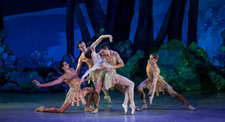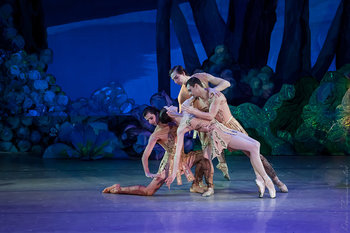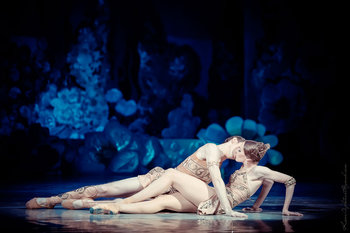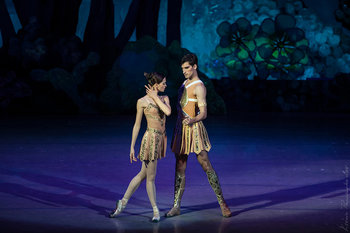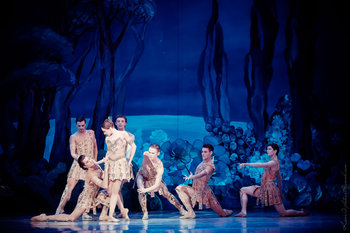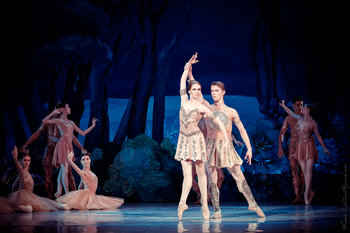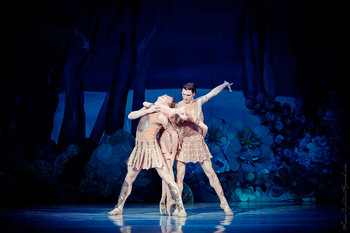SUMMARY
The beautiful nymph Aіalges sleeps in a garden not far from the ruins of an ancient castle. During the day she tries to avoid the hot sun in the shade of the trees. But in velvety twilight she awakes, expecting the wonderful gifts of the forthcoming night. Upon awakening, the nymph finds herself accompanied by small elves called Vectolinos, who also inhabit the magical garden. The graceful winged elves fly among the branches of the trees and amuse the beautiful nymph. And as soon as the first rays of the sun break through and the morning dawns, they help her fall asleep, softly singing gentle songs...
Together with the elves, the wonderful Sanas night fairies inhabit the garden - they who like to comb their long hair with golden combs. They often meet with the elves to sing and dance. Just as they meet tonight for their shared celebrations. And only the beautiful nymph Aialges remains sad. Seeing the sad nymph, one of the elves invites her to taste the wonderful nectar collected from the flowering trees of the garden. The nectar arouses in her soul a premonition of something incomprehensible and beautiful. Unexpectedly, on her way Aialges meets the magical Boosgosu - a resident and protector of the Asturian forest. He is famous for often stealing and seducing beautiful girls. Between Aialges and Boosgosu, a passionate and irresistible feeling erupts, to which they fully surrender.
Boosgosu demands Aialges swear allegiance to him, but the nymph is in no haste to do so. The handsome Boosgosu retires. Aialges is once again embraced by sadness. The elf proposes that she drink the magic nectar once again, but the nymph sends him away. However, the elf does not relent in his desire to help beautiful nymph, and asks one of the fairies to remind Aialges of the feelings the magic nectar could imbue her with. Carelessly, Aialges drinks the magic and deceitful nectar. In anticipation of ardent love Aialges meets Nuber, the handsome and fearsome lord of clouds and lightning. She does not immediately respond to his rude courtship. A dispute arises between them - who is the most powerful in this garden?! Taunting and jeering at the formidable Nuber, the charming nymph still falls into his arms. He also demands her unconditional allegiance. But the nymph runs away from him. Hiding in the garden, she thinks about who is worthy to be by her side.
Her thinking is interrupted by the appearance of both handsome men. Each of them feels sure of the right to the heart of the nymph. This should be decided by a duel. But the nymph stops the battle. Gracing both Boosgosu and Nuber with a kiss, she also refuses them both.
The night ends, and with it everything that happened in the twilight of the Generalife magical garden. The weary Aialges again retires under the spreading crown of trees, so that under their protection they can wait for the seductive and charming gifts of the night...
The ballet recital follows the narration principle of the Spanish novels that is to tell the stories not coupled directly with each other. The principle opens up a possibility to stage two brilliant pieces of Manuel de Falla, the famous composer of the beginning of the 20th century: “NIGHTS IN THE GARDENS OF SPAIN” (“NOCHES EN LOS JARDINES DE ESPAÑA”) and “THE THREE-CORNERED HAT” (“EL SOMBRERO DE TRES PICOS”)
The first masterpiece “The Nights in the Gardens of Spain” (subtitled by author as “symphonic impressions for piano and orchestra”) is composed in a form of triptych with a special title for each part: “El en Generalife” (“In the Generalife”), “Danza lejana” (“A Distant Dance”), and “En los jardines de la Sierra de Cordoba” (“In the Gardens in the Sierra de Cordoba”). The ballet is created for the music filled with а poetry of Spanish nature and a lyricism of the Spanish heart – for the melodies overendowned with both dreamy lyricism, harsh consonances and vigorous rythms. Due to the Spanish legends and tales in its canvas, the dance is of a romantic and fantasy nature. Mythical heroes tell us about the search for enjoiment and love…
The second masterpiece presents a fantasy on a folk and historical theme: dynamic picture of life in Spanish province after the well-known novel by Pedro Antonio de Alarcon. The ballet music scintillates with wit and fascinates with composer’s design and technique. From time to time, the author weaves the guitar improvisations, flamenco rythms and the Spanish folk dances – fandango, jota, sevillianas, and farruca – into his ingenious music canvas.
Combining the two music pieces in one performance, we got an amazing choreographic tale about love. But love in quite different forms: unearthly love and earthly one.
Aniko Rekhviashvili
